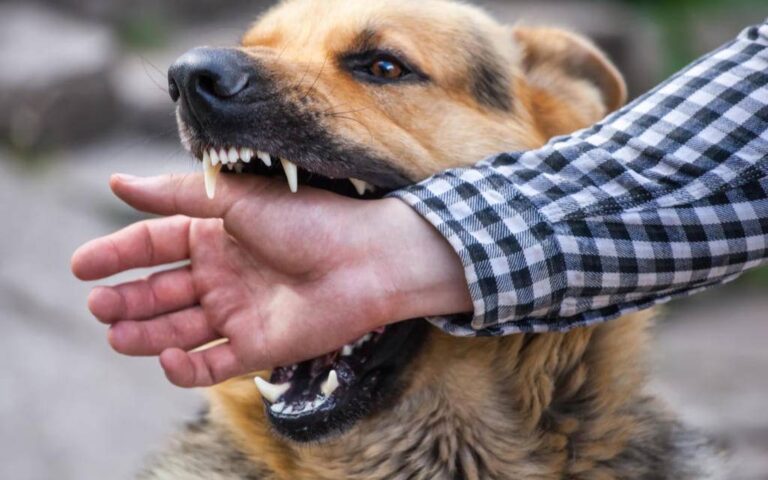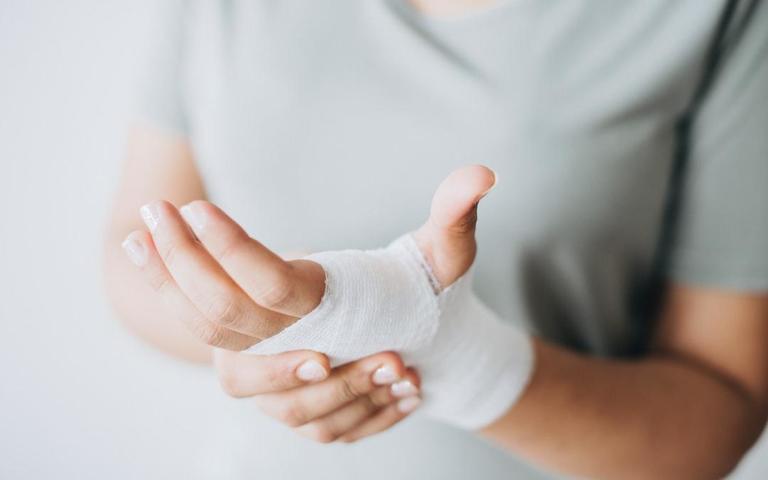
Getting bitten by a dog can be a frightening and painful experience. Whether you're dealing with a minor nip or a serious wound, knowing exactly what to do after a dog bite injury can make all the difference in your recovery and ability to seek compensation later.
Every year, over 4.5 million Americans suffer dog bite injuries, and many victims aren't sure what steps to take immediately following an attack. This guide provides a clear, step-by-step action plan covering everything from emergency first aid to documenting the incident for potential legal claims.
The first 30 minutes after a dog bite are critical. Here's exactly what you need to do, in order of priority.
Answer a few questions to get an estimate of your case value
If the dog is still aggressive or nearby, move away calmly but quickly to a safe location. Don't run, as this can trigger a chase response. Once safe, assess your injury and determine if you need immediate emergency care.
This step is crucial and often forgotten in the confusion after an attack. Before leaving the scene, collect:
If the dog owner isn't present or it's a stray dog, note the location, time, and any identifying features of the animal. Hospitals will need the dog's vaccination history to determine if you need rabies shots or other preventive care.
If you're seriously injured: Ask a bystander, family member, or emergency responders to help collect this information while you focus on your injury.
If anyone saw the attack, get their contact information. Dog owners sometimes dispute how an incident occurred, making witness accounts critical for protecting your rights.
From each witness, collect:
Even if you don't think you'll pursue legal action, having witness information gives you options later.
After handling the immediate situation, assess your injury and provide first aid if needed.
If the dog's teeth didn't break your skin:
Important: Even minor dog bites should be professionally evaluated. Visit an urgent care clinic to have the injury documented—this medical record could be important later.
Puncture wounds are the most common type of dog bite injury and require careful attention.
Immediate first aid:
Seek emergency care immediately if:
Many people wonder if their dog bite injury really requires medical attention.
Contact a doctor immediately if you develop:
Infections can develop within hours to days after a dog bite.
Understanding what to expect can help reduce anxiety about seeking care.
Treatment typically includes:
Proper documentation is essential whether you're considering legal action or just want to protect your options.
Photos are powerful evidence that capture the severity of your injuries.
Photography tips:
Record a detailed account of the incident while it's fresh:
About the attack:
About your injuries:
The easiest method is recording a voice memo on your smartphone.
Create a dedicated file for all documents related to your dog bite injury:
Document how the dog bite affects your daily life:
This journal demonstrates the full impact of your injury beyond just medical bills.
Once you've addressed immediate medical concerns and documented everything, you can evaluate your legal options.
You may be entitled to compensation if:
Most homeowner's and renter's insurance policies cover dog bite injuries, meaning compensation is typically available.
Dog bite victims may recover compensation for:
Economic damages:
Non-economic damages:
Every state has a statute of limitations for personal injury claims, typically ranging from 1-6 years. However, don't wait until the deadline approaches. Evidence can disappear, witnesses can move away, and memories fade.
Consider consulting with a dog bite attorney if:
Most personal injury attorneys offer free consultations and work on contingency (no fees unless you win), so there's no financial risk in exploring your options.
Even if the bite seems minor, infections can develop quickly. Delaying care can worsen infections, lead to permanent damage, and weaken your legal claim.
The dog owner's insurance company may contact you quickly, asking for a recorded statement. Politely decline until you've consulted with an attorney. Insurance adjusters are trained to get information they can use to minimize payouts.
Insurance companies often make low initial offers before you realize the true cost of your injuries. Once you accept a settlement, you typically cannot seek additional compensation later, even if complications arise.
Avoid posting about the incident or your activities on social media. Insurance companies regularly check social media for evidence to use against claimants. Even innocent posts can be taken out of context.
Now that you know what to do after a dog bite injury, don't delay taking action. Every step you take in the hours and days following an attack impacts both your physical recovery and your ability to seek fair compensation.
Your action checklist:
If you have questions about your specific situation, consider reaching out to a qualified personal injury attorney specializing in dog bite cases for a free consultation. They can evaluate your case, explain your options, and help ensure you receive the full compensation you deserve for your injuries.
Getting bitten by a dog can be a frightening and painful experience. Whether you're dealing with a minor nip or a serious wound, knowing exactly what to do after a dog bite injury can make all the difference in your recovery and ability to seek compensation later.
Every year, over 4.5 million Americans suffer dog bite injuries, and many victims aren't sure what steps to take immediately following an attack. This guide provides a clear, step-by-step action plan covering everything from emergency first aid to documenting the incident for potential legal claims.
The first 30 minutes after a dog bite are critical. Here's exactly what you need to do, in order of priority.
If the dog is still aggressive or nearby, move away calmly but quickly to a safe location. Don't run, as this can trigger a chase response. Once safe, assess your injury and determine if you need immediate emergency care.
This step is crucial and often forgotten in the confusion after an attack. Before leaving the scene, collect:
If the dog owner isn't present or it's a stray dog, note the location, time, and any identifying features of the animal. Hospitals will need the dog's vaccination history to determine if you need rabies shots or other preventive care.
If you're seriously injured: Ask a bystander, family member, or emergency responders to help collect this information while you focus on your injury.
If anyone saw the attack, get their contact information. Dog owners sometimes dispute how an incident occurred, making witness accounts critical for protecting your rights.
From each witness, collect:
Even if you don't think you'll pursue legal action, having witness information gives you options later.
If you were bitten by a stray dog or cannot locate the owner, call animal control immediately. Even if the dog has an owner, consider filing a report. This creates an official record and may reveal if the dog has bitten others before.
Animal control reports are especially important for:
After handling the immediate situation, assess your injury and provide first aid if needed.
If the dog's teeth didn't break your skin:
Important: Even minor dog bites should be professionally evaluated. Visit an urgent care clinic to have the injury documented—this medical record could be important later.
Puncture wounds are the most common type of dog bite injury and require careful attention.
Immediate first aid:
Seek emergency care immediately if:
Many people wonder if their dog bite injury really requires medical attention.
Contact a doctor immediately if you develop:
Infections can develop within hours to days after a dog bite.
Understanding what to expect can help reduce anxiety about seeking care.
Treatment typically includes:
Proper documentation is essential whether you're considering legal action or just want to protect your options.
Photos are powerful evidence that capture the severity of your injuries.
Photography tips:
Record a detailed account of the incident while it's fresh:
About the attack:
About your injuries:
The easiest method is recording a voice memo on your smartphone.
Create a dedicated file for all documents related to your dog bite injury:
Document how the dog bite affects your daily life:
This journal demonstrates the full impact of your injury beyond just medical bills.
Once you've addressed immediate medical concerns and documented everything, you can evaluate your legal options.
You may be entitled to compensation if:
Most homeowner's and renter's insurance policies cover dog bite injuries, meaning compensation is typically available.
Dog bite victims may recover compensation for:
Economic damages:
Non-economic damages:
Every state has a statute of limitations for personal injury claims, typically ranging from 1-6 years. However, don't wait until the deadline approaches. Evidence can disappear, witnesses can move away, and memories fade.
Consider consulting with a dog bite attorney if:
Most personal injury attorneys offer free consultations and work on contingency (no fees unless you win), so there's no financial risk in exploring your options.
Even if the bite seems minor, infections can develop quickly. Delaying care can worsen infections, lead to permanent damage, and weaken your legal claim.
The dog owner's insurance company may contact you quickly, asking for a recorded statement. Politely decline until you've consulted with an attorney. Insurance adjusters are trained to get information they can use to minimize payouts.
Insurance companies often make low initial offers before you realize the true cost of your injuries. Once you accept a settlement, you typically cannot seek additional compensation later, even if complications arise.
Avoid posting about the incident or your activities on social media. Insurance companies regularly check social media for evidence to use against claimants. Even innocent posts can be taken out of context.
Now that you know what to do after a dog bite injury, don't delay taking action. Every step you take in the hours and days following an attack impacts both your physical recovery and your ability to seek fair compensation.
Your action checklist:
If you have questions about your specific situation, consider reaching out to a qualified personal injury attorney specializing in dog bite cases for a free consultation. They can evaluate your case, explain your options, and help ensure you receive the full compensation you deserve for your injuries.

Here, we’ve written you a comprehensive list of all the legal and medical steps you need to take after receiving a dog bite wound. We’ve listed the immediate steps first, then the follow-up actions for legal recourse.
Don’t wait to take action. Follow this guide on what to do after a dog bite.


Medical attention is obviously a priority in an injury case. But it’s also less likely to be overlooked than steps taken to ensure legal recourse. But getting to a doctor and cleaning the wound, getting stitches, and having medical documentation and even photos of the inital wounds are huge parts of a success dog bite case. And seeing as we’re a personal injury legal site, we’ve listed the legal steps first so you won’t overlook them.
In the hustle and bustle immediately following a dog-bite incident, emotions are high and you may be in a great amount of pain. It can easily slip your mind to exchange information. But it’s vital you do so, especially if you’re considering contacting a dog bite lawyer for legal action.
If you were the victim of a hit-and-run and were still conscious, you’d try your best to memorize the license plate of the car fleeing the scene, wouldn’t you? Though your injury case may be very different than a hit-and-run, collecting contact information from the dog’s owner is just as important. You’ll need an easy way to contact them later if you wish to take any legal action.
If you require medical attention, you will also need this information for the hospital’s reference. They’ll need to contact the owner to obtain the dog’s vaccination records or other information related to your injury. Before going to the hospital, make sure you or someone with you collects contact information.

Witnesses of any crime have a legal responsibility to appear in court if called upon. So, as with car accidents, contact information must also be collected from witnesses of the dog bite incident.
Eyewitness accounts are a huge help to your case if this does end up in court. And if it doesn’t, there’s still no harm done.
Document as many details of the event as you can, as soon as you can, to the best of your ability. This is just like photographing evidence of a car accident for insurance claims.
Take pictures of the wound from several angles. Write down or record a verbal account of the injury and any symptoms associated with it.
Describe what it looks like, pain levels, and anything affected by it. That is, note if it impairs your ability to perform specific functions. Record specifically what those functions are and how they will affect your daily life.
Also, describe how the event happened. Be as detailed as you can.
It’s best to record this detailed account of the entire event while it’s still fresh in your memory. The easiest way is to use your smartphone to record it on video or as an audio file.
If you are unable to do this because of your injury, ask someone with you or a witness to do it.
Stray dogs biting people is a huge health hazard to your community and must be stopped. If the dog that bit you has no collar and/or no owner present, call animal control immediately. The sooner you relay its location, the more likely they are to capture it.
In addition to civic duty, this is also important for your health. Once the animal is captured, it can be determined if it has any diseases that may have been transmitted through the bite.
By capturing the animal, it may also be discovered that it does have an owner. The owner may put up lost dog photos in the area or contact animal control searching for it.
If this happens, you have the opportunity for legal recourse. But, unfortunately, if no owner is discovered, you’re unlikely to prove anyone was legally responsible.
Once you have the dog owner’s information, you need to have the wound looked at by a medical professional right away. Even if the wound doesn’t seem serious, it’s best to receive professional health care to prevent dangerous infections.
Head to the ER where doctors can diagnose the seriousness of the wound and apply antibiotics. Have a friend or ambulance transport you if you are unable to drive because of your injury.
Immediate, professional medical attention is also important for legal reasons. This way, the injury will be well documented in the hospital’s records.
Now, here are some steps you can take to treat the wound before arriving at the hospital.


If the wound hasn’t broken the skin and there’s no lasting pain, you probably don’t need medical attention. But you still may want to seek a professional diagnosis for your records.
For this, you’ll want to go to urgent care rather than the emergency room. And you definitely still need to exchange information with the dog’s owner.
These steps will make it easier to take legal action if the wound starts acting up later.
These can be frightening as they tend to bleed quite a bit. And the sight of losing one’s own blood often induces panic.
Your instinctual response will probably be to stop the bleeding as quickly as possible. But, in fact, it’s better to let it bleed for a few minutes.
Initially, the bleeding actually helps to clean out the wound to prevent infection. Unless the blood is coming out very forcefully, or in large amounts very quickly, allow it to bleed freely for about five minutes.
After that, try to stop the bleeding with a clean cloth or gauze. If the bleeding doesn’t stop, alert emergency medical help and inform them of the situation.
If it does stop, carefully wash the wound in water with gentle soap. Cover the wound with sterile gauze or cloth.
Do not use harsh medical products, like alcohol, iodine, and hydrogen peroxide. These can hinder the healing process for puncture wounds.
By this point, you should be at the hospital, awaiting or receiving care.

If the dog is a stray or the owner can’t be found, inform animal control as mentioned above. Treat the wound as you would according to the above steps. Since there’s an increased chance of disease from stray dog bites, it’s especially important to let puncture wounds bleed for five minutes.
If the wound has broken the skin, call 911. Diseases can spread fast and it’s important for you to receive the necessary vaccinations right away.
The first thing the ER will do is evaluate the urgency of your situation. Seeing that it’s an animal bite, you should receive care somewhat quickly.
They will also ask you questions to get a detailed account of how the injury happened. They’ll want to know the dog’s vaccination history, too. This information makes it easier to provide proper treatment.
When a doctor becomes available to treat you, he/she will thoroughly cleanse the wound and apply any necessary antibiotics or vaccinations. You may also receive stitches for deep or extensive gashes.
It’s also common to receive a booster shot after animal bites, especially if you’re overdue for your tetanus shot. You may receive several additional vaccinations, including rabies, if the dog that bit you was a stray.
Afterward, the doctor will probably prescribe oral or topical antibiotics to continue fighting the infection.

Beyond the first steps described above, here’s how to follow up for legal recourse.
Continue documenting the effects of the injury. Keep all records and documentation related to the event and collect as much proof as you can to support your case.
Keep records, receipts, and a tally of all medical expenses. Add to this any additional expenses resulting from the injury. This includes lost pay from time off work, cab fares for being unable to drive, etc.
These documents are easily verifiable proof in support of your case. They also make it easy to determine the exact amount of compensation you’re entitled to.
Dog bite lawsuits are very common. As such, it shouldn’t be difficult to find an attorney with experience with these cases.
As soon as you even consider taking legal action, contact a personal injury attorney. Most lawyers offer a free consultation to victims of injury.
Even if it ends up as an insurance settlement rather than a personal lawsuit, a personal injury attorney is key. They will know how best to deal with the other party’s insurance company to get the compensation you deserve.
Would you like to know more about Dog Bite Case? Click Here
If you or a loved one is dealing with a situation like this, give us a call any time, day or night. We are here to help. 312-500-4500


Scott DeSalvo founded DeSalvo Law to help injured people throughout Chicago and surrounding suburbs. Licensed to practice law in Illinois since 1998, IARDC #6244452, Scott has represented over 3,000 clients in personal injury, workers compensation, and accident cases.
No Fee Unless You Win | Free Consultation | 24/7 Availability Call or Text: (312) 500-4500
>>Read More
Main Office:
1000 Jorie Blvd Ste 204
Oak Brook, IL 60523
New Cases: 312-500-4500
Office: 312-895-0545
Fax: 866-629-1817
service@desalvolaw.com
Chicago and Other Suburban Offices
By Appointment Only